Inside Jeffrey Epstein's Spy Industry Connections
Leaked emails show Epstein’s attempts to dabble in security tech—across borders—in the last years of his life.
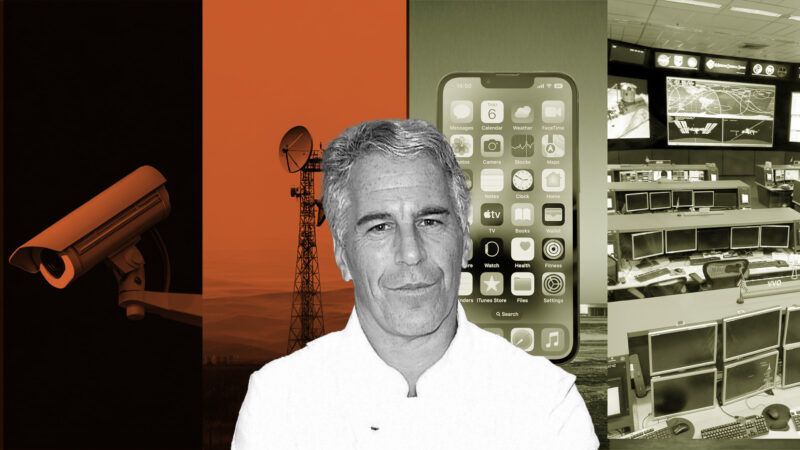
After his first arrest for sex crimes, Jeffrey Epstein tried to get into a new line of work: surveillance. In 2015, he partnered with former Israeli Prime Minister Ehud Barak to invest in a security tech startup called Reporty Homeland Security, now known as Carbyne. Leaked emails show that Epstein was using Barak to seek out opportunities in the surveillance industry and build connections with powerful figures around the globe, including American businessman Peter Thiel, the former director of Israeli signals intelligence, and two people in Russian President Vladimir Putin's circle.
After he was first caught sexually exploiting teenage girls, Epstein had pleaded guilty to soliciting prostitution in 2008; he served a little over a year in detention. Meanwhile, he invested his wealth in bizarre projects, including a ranch to breed women with his DNA and "efforts to identify a mysterious particle that might trigger the feeling that someone is watching you," according to The New York Times.
The leaked emails show that Epstein was also interested in more mundane means of spying on and manipulating people, which overlapped with the technologies governments often pursue. This interest crossed borders.
Barak's email inbox was quietly posted by Distributed Denial of Secrets, a website widely considered to be a successor to WikiLeaks, on a file-sharing platform for verified journalists and researchers in May 2025. The contents came from Handala, a hacker group named for a Palestinian cartoon character that has been leaking files taken from senior Israeli officials for several months.
Although the emails were posted without technical metadata or cryptographic signatures that would allow their authenticity to be verified, they include dozens of images, videos, voice recordings, and scanned documents from Barak and his friends and family that have never been published elsewhere. And they include information that was not publicly known at the time of the email leaks, including a reference to Epstein's birthday book.
The emails below, which have not been published elsewhere, paint a picture of Epstein as a man very eager to be at the nexus between private money and public surveillance. While they were hammering out the Reporty investment, Epstein invited Barak to come to a meeting with Thiel, cofounder of PayPal and the surveillance contractor Palantir, in May 2014. Although Barak couldn't make that meeting, Epstein insisted that Barak "spend real time with peter thiel [sic]" and offered to set up a dinner the following month.
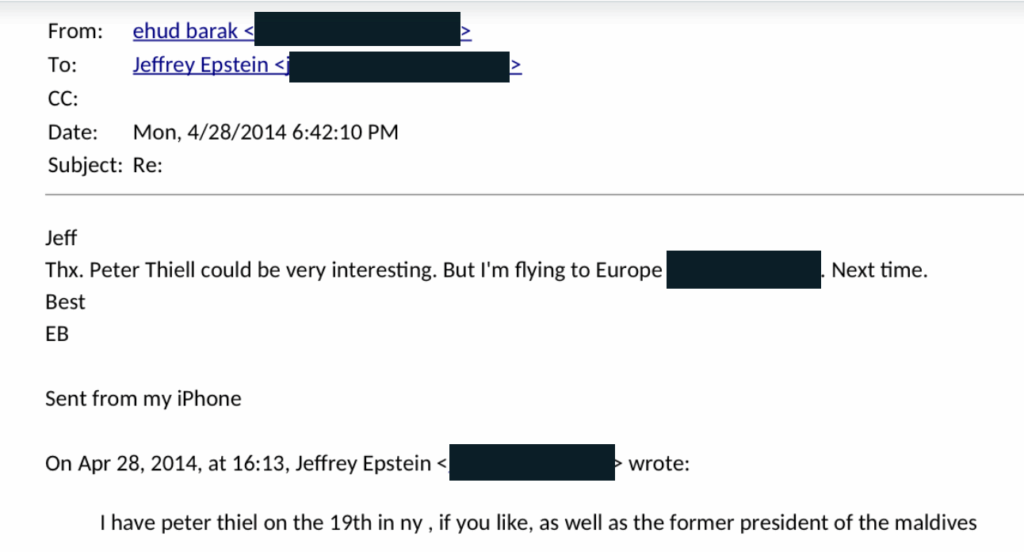

Barak wrote to a different business associate a few days later, without mentioning Epstein's role, that he and Thiel would have a "first date" and "probably spend it talking just geopolitics" with an unnamed third person. In that email, Barak added that he had met Thiel once before in Davos, Switzerland, but speculated that Thiel "probably doesn't even recall it."
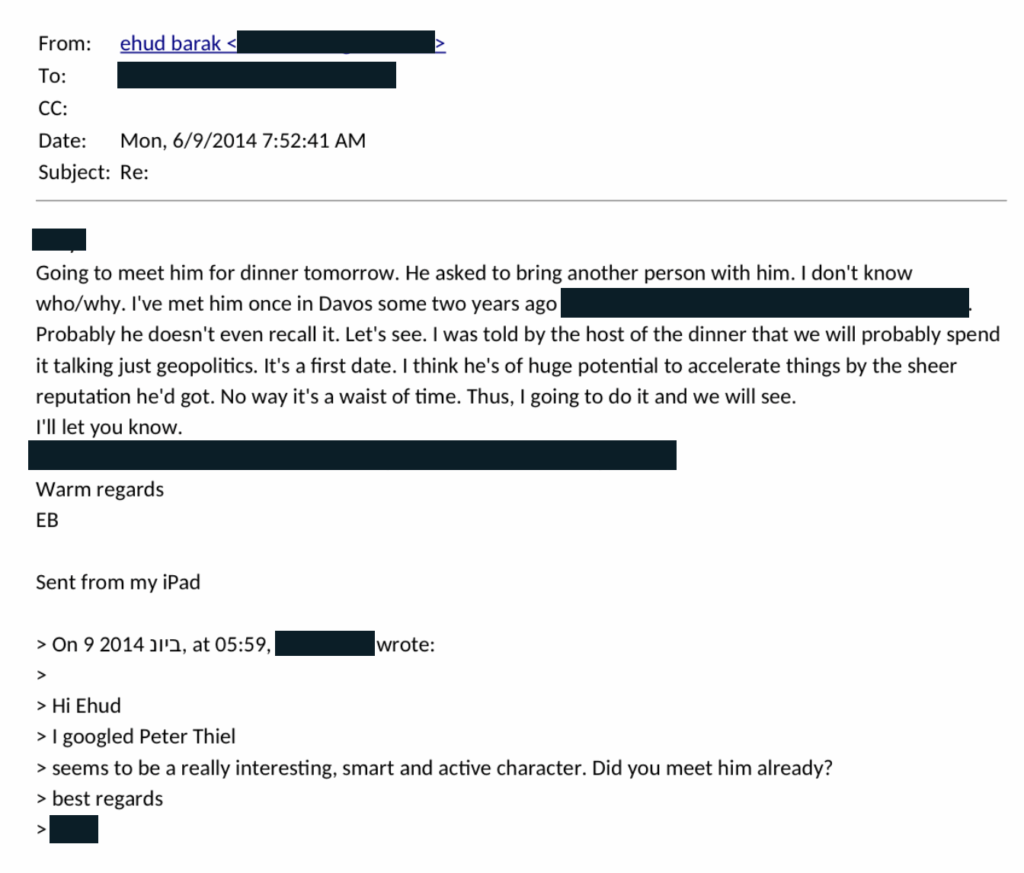
It's not clear exactly what happened in that meeting. In February 2016, however, Epstein pitched Reporty to Valar Ventures, a fund co-founded by Thiel and two close partners. "We'd love to hear more about Reporty, are you in NYC in the near term or would a phone call make more sense? Thanks for thinking of us Jeffrey," Valar Ventures general partner Andrew McCormack wrote back.
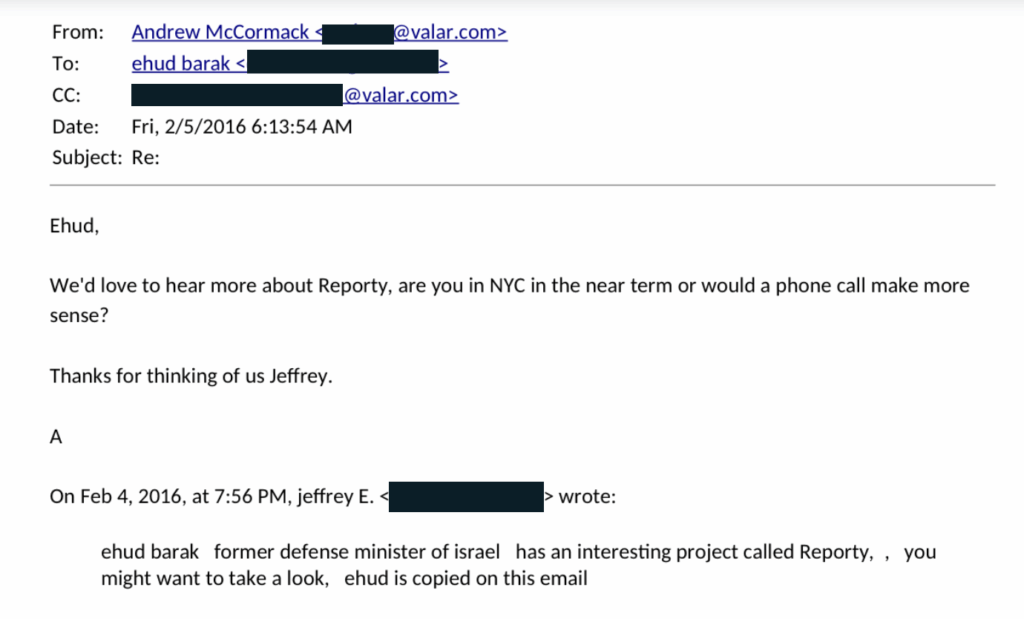
After meeting with the Reporty team, McCormack rejected the proposal as premature, adding that "we remain fans of what you are building and hope to re-engage in the future when the story comes into clearer focus." In 2018, the Founders Fund—another firm cofounded by Thiel—joined a $15 million Series B funding round for the company, which by then had been renamed Carbyne.
While Epstein was trying to deal with the American tech sector, he was portraying himself to Russian elites as an apolitical wheeler-dealer. In April 2015, Epstein introduced Barak to former Russian Deputy Minister of Economic Development Sergey Belyakov, who then invited Barak to attend the St. Petersburg International Economic Forum. That wasn't the only business Epstein had in mind.
"I spoke to sergey afterwards. he will help. I suggest you send him a note that states. that you think Putin and his advisors would benefit from spending some time with Jeffrey to discuss markets. currency and the financial system in the new world of zero interest rates. and that I am not political," Epstein wrote in a separate email to Barak.
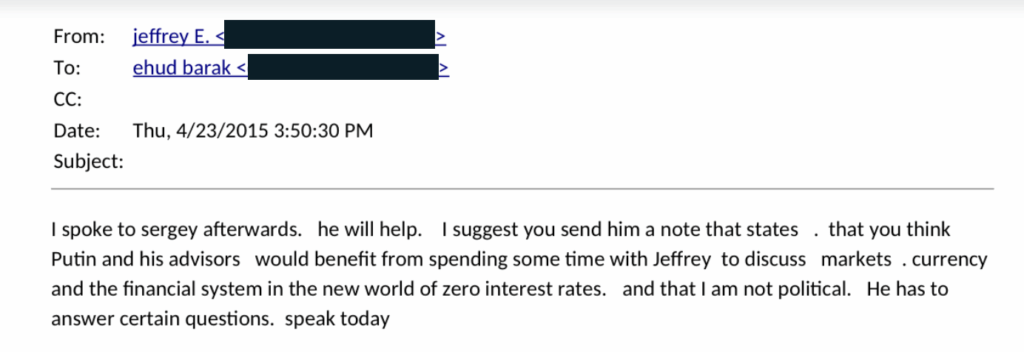
According to the Russian opposition news outlet Dossier Center, Epstein offered Belyakov advice working around U.S. economic sanctions against Russia. Sen. Ron Wyden (D–Or.) alleged in July 2025 that the U.S. Treasury had files on Epstein's transactions with now-sanctioned Russian banks adding up to hundreds of millions of dollars.
Barak kept Epstein abreast of his contacts with another Russian businessman, Viktor Vekselberg, a Putin ally. While scheduling the Thiel meeting, Barak asked Epstein if there was time that day to have coffee with a man referred to as "VV" and "Viktor."

In April 2015, Barak asked Epstein what he thought of Fifth Dimension, an intelligence company backed by Vekselberg. The pitch slideshow that Barak sent promised the "transformation of massive scale data from multiple feeds into actionable intelligence utilizing artificial intelligence in an automated real-time manner," and it included mockups of surveillance screens and maps tracking individual people.
Epstein wrote back that Barak should call him on the phone. Although it's not clear what came of the call, they didn't discuss the project further. Fifth Dimension was shut down in 2018 after Vekselberg came under U.S. economic sanctions for alleged election meddling.
Throughout their relationship, Epstein signalled to Barak that he was interested in keeping abreast of security-related technology, emailing Barak articles about cyber warfare, emergency preparedness, Russian nanotechnology, and Unit 8200, the Israeli equivalent of the National Security Agency. "I enjoy strategy, and strategic planning, and at the same time am AMAZED by the rate of which technology has moved into the private sector," Epstein mused in an April 2015 email, adding that "many corporations are looking for a new military like perspective on mgmt."
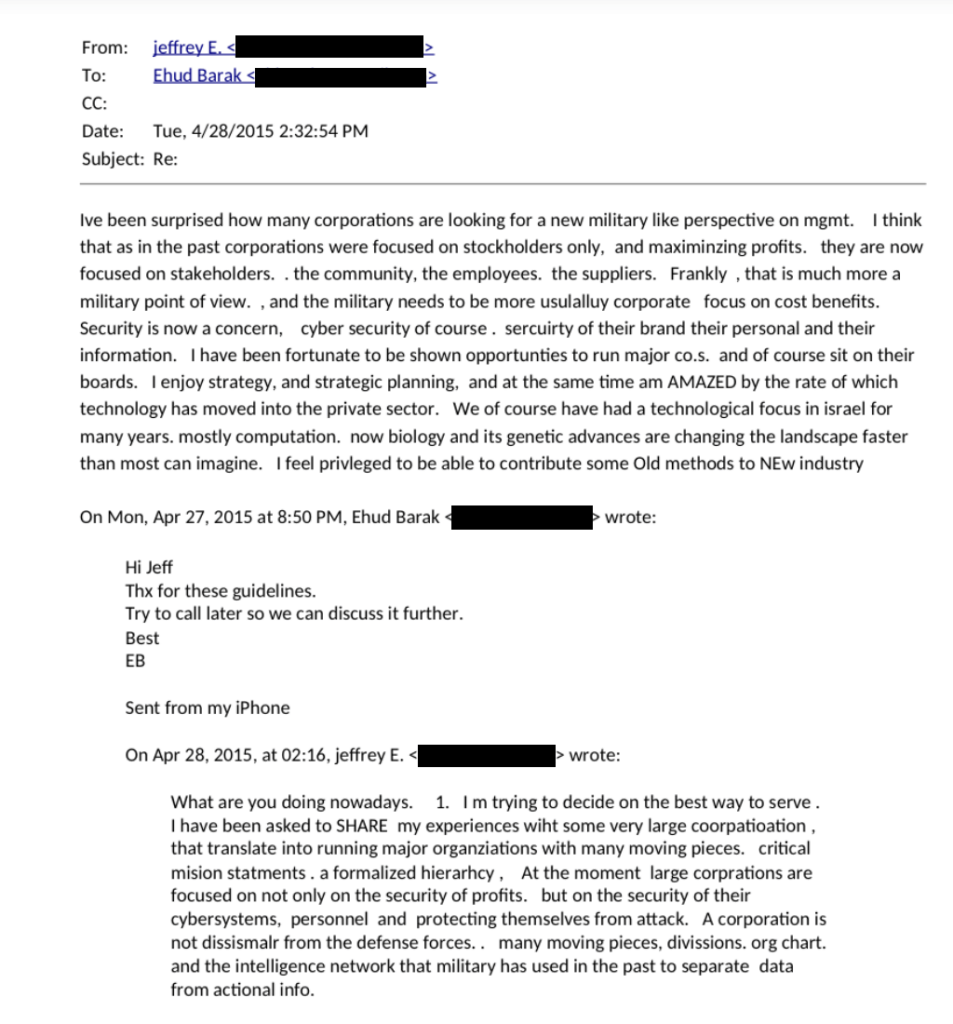
Reporty, a startup focused on overhauling 911 emergency dispatch technology, could bring Epstein into that world. One of its cofounders and directors was Pinchas Buchris, a former director of Unit 8200. Buchris told Haaretz, the Israeli newspaper that broke news of Epstein's involvement in 2019, that the investment was structured to conceal Epstein's role: "Barak brought the money and as far as I'm concerned it's his. I don't know Epstein and haven't met him."
Yet the emails show that Barak scheduled a virtual meeting with Epstein and Buchris together in December 2014, and told his lawyer to alter the terms of the investment based on Buchris' input.

After Epstein's re-arrest in July 2019, Barak announced that he was dissolving his investment partnership with Epstein. Neither Barak nor Buchris are still on the board of the company.
In April 2016, Barak asked Epstein to invest in Levitection, an electromagnetic imaging startup. "Couldn't see a product, they don't have it yet. But they're leading experts on advanced radars. Made sci-fi like achievements in military products," Barak wrote, adding that Levitection's staff were all veterans of the Israeli weapons company Rafael Advanced Defense Systems.
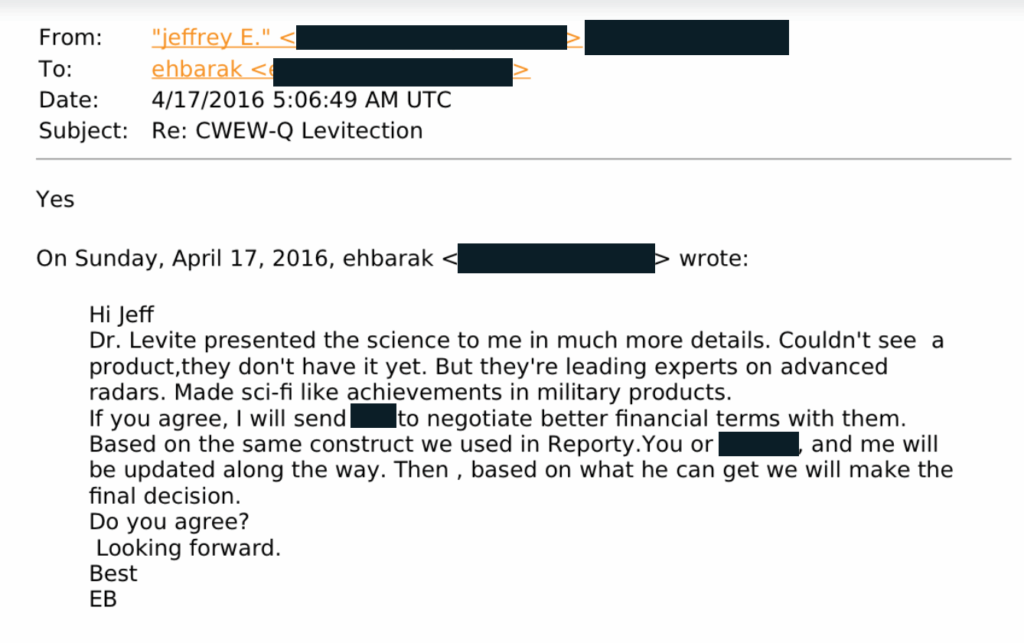
Levitection received part of a $1.5 million contract with the U.S. Department of Homeland Security in 2020 for developing "electromagnetic imaging and artificial intelligence to detect threats and concealed items in wide-open areas." The company went out of business in 2022. Gideon Levita, a former Iron Dome missile defense engineer, is now running a similar startup called Scanary. Its promise is to perform mass airport-security-style scans of crowds using miniaturized radar.
Barak offered to use "the same construct we used in Reporty" with Levitection, and Epstein agreed to have Barak's lawyer negotiate terms. Levita tells Reason via a colleague that "Ehud Barak has never been an investor in Levitection" and added, "Jeffrey Epstein was never mentioned in any context related to the company."
The emails also contain some tantalizing hints at Epstein's other international endeavors. Epstein told Barak about a business prospect he heard about from Britain's Prince Andrew, who has recently come under fire for his ties to an alleged Chinese spy: "wealthy chines looking for to start personel protection co in beijing, kidnapping has begun."
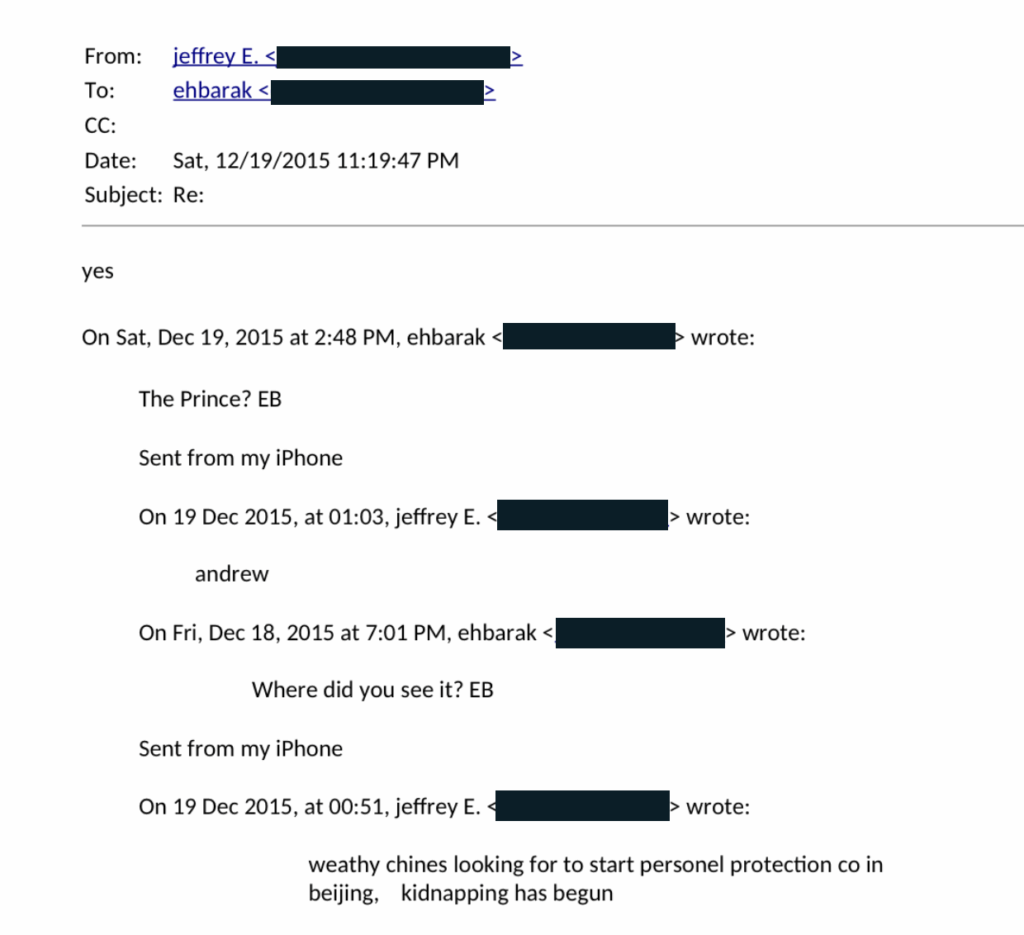
Barak did not respond to multiple requests for comment, sent to his personal email, to his wife, to the lawyer who represented him in these business negotiations, and to the American speaker's agency that represents him now. Neither did McCormack, Vekselberg, Belyakov, Buchris, Carbyne, the British royal court, or a spokesman for the Thiel Foundation.
"I saw a business opportunity," Barak told Haaretz in 2019. In a later interview with The Wall Street Journal, he called Epstein "a terrible version of Dr. Jekyll and Mr. Hyde" who "at the time seemed to be an intelligent person, socially well connected and of wide areas of interest, from science to geopolitics" and said he did not participate in or know about any of Epstein's parties with women or girls.
Thiel acknowledged to The Wall Street Journal in 2023 that he had met with Epstein more than once in 2014 for unnamed networking opportunities. (The report did not mention Barak's involvement.) "I didn't think enough about what Epstein's agenda might have been," Thiel told the paper.


Show Comments (22)